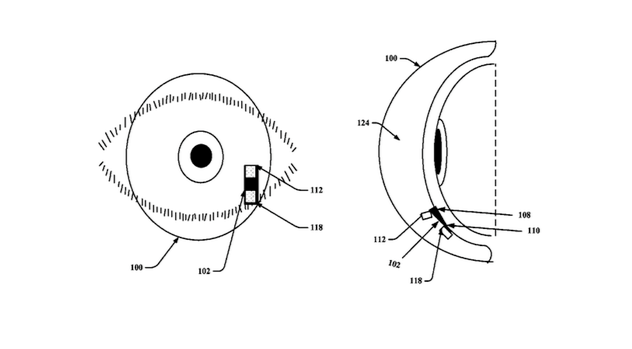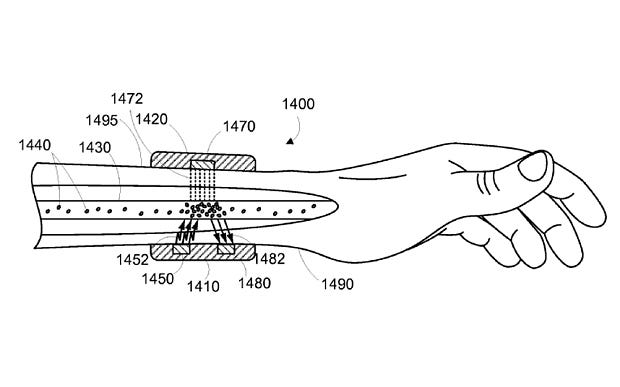How Google Is Bolstering Its Medical IP Portfolio
March 26, 2015
The search engine giant continues to build its collection of medical-related intellectual property, including a smart contact lens and a nanotech wearable that may treat cancer.
Nancy Crotti
|
Google recently was granted a patent for its smart contact lens technology. |
Google won a patent for a novel contact lens in the same month that it filed a patent for a nanotech wearable medical device that could possibly detect cancer.
Google wouldn't explicitly confirm whether the former patent covers the glucose-sensing contact lens currently being refined by its partner, the Swiss multinational Novartis.
Still, several scientific papers referenced in the patent mention glucose monitoring through tears. An abstract included in the patent describes a lens that would include a sensor and a chip in separate layers of polymer, interconnections between the substrates, and metal pads that can hold a chip on the second substrate. "The uneven surface can be a sloped surface or one or more sloped channels in the substrate, and the channels can be wide enough to receive interconnections for the chip and to receive the chip," the abstract continues.
Google applied for the patent in September 2012.
The lens would measure diabetic patients' glucose levels through their tears, alleviating the need for pricking their skin several times a day to draw blood for the same purpose.
Google is staying mum on its plans for the patent.
"We hold patents on a variety of ideas--some of those ideas later mature into real products or services, some don't," a Google spokesperson wrote in an email to Time magazine. "Prospective product announcements should not necessarily be inferred from our patents."
Last July, Google announced a partnership with Swiss multinational Novartis and its Alcon eye care division, just seven months after news broke that the Mountain View, CA-based company planned to develop a contact lens that could help diabetics keep track of their blood glucose levels.
Alcon agreed to in-license Google's "smart lens" technology for all ocular medical uses. Novartis' goal was to have a prototype ready for research and development reviews by early 2015, the Wall Street Journal previously reported.
As for Google's intellectual property related to a wrist-worn nanotech-enabled sensor, it could possible be used to treat cancer. The abstract states the device "can automatically modify or destroy one or more targets in the blood that have an adverse health effect." The Telegraph even went so far to hint, in hyperbolic fashion, that the device could be a cure for cancer.
|
Google's proposal for a nanotech-powered wearable shown in a patent filing. |
Google's smart contact lens technology seems closer to commercialization, and also enjoys robust intellectual property protection. The tech giant also previously applied for a patent to embed a camera within a contact lens. The "smart" part of this new lens will allow it to process image data and perform other functions locally or via a remote device. The 2012 patent application describes a contact lens that includes an embedded circuit, camera, and sensor. The control circuit, the application states, could be wired or linked wirelessly to the camera and sensor. The sensor could be a light sensor, pressure sensor, temperature sensor, or electrical field sensor.
With all this focus on contact lenses, Google put its Google Glass initiative on the back burner in January, removing it from Google[x] laboratories, and halting sales January 20. Still, the company hinted that reports of Google Glass' death were premature.
"Since we first met, interest in wearables has exploded, and today it's one of the most exciting areas in technology," the Google+ announcement said. "Glass at Work has been growing, and we're seeing incredible developments with Glass in the workplace. ... You'll start to see future versions of Glass when they're ready."
As for the glucose-monitoring contact lenses or cancer-destroying wristbands, the world will also have to wait and see.
Refresh your medical device industry knowledge at BIOMEDevice Boston, May 6-7, 2015. |
Brian Buntz is the editor-in-chief of MPMN and Qmed. Follow him on Twitter at @brian_buntz.
Nancy Crotti is a contributor to Qmed and MPMN.
Like what you're reading? Subscribe to our daily e-newsletter.
About the Author(s)
You May Also Like




